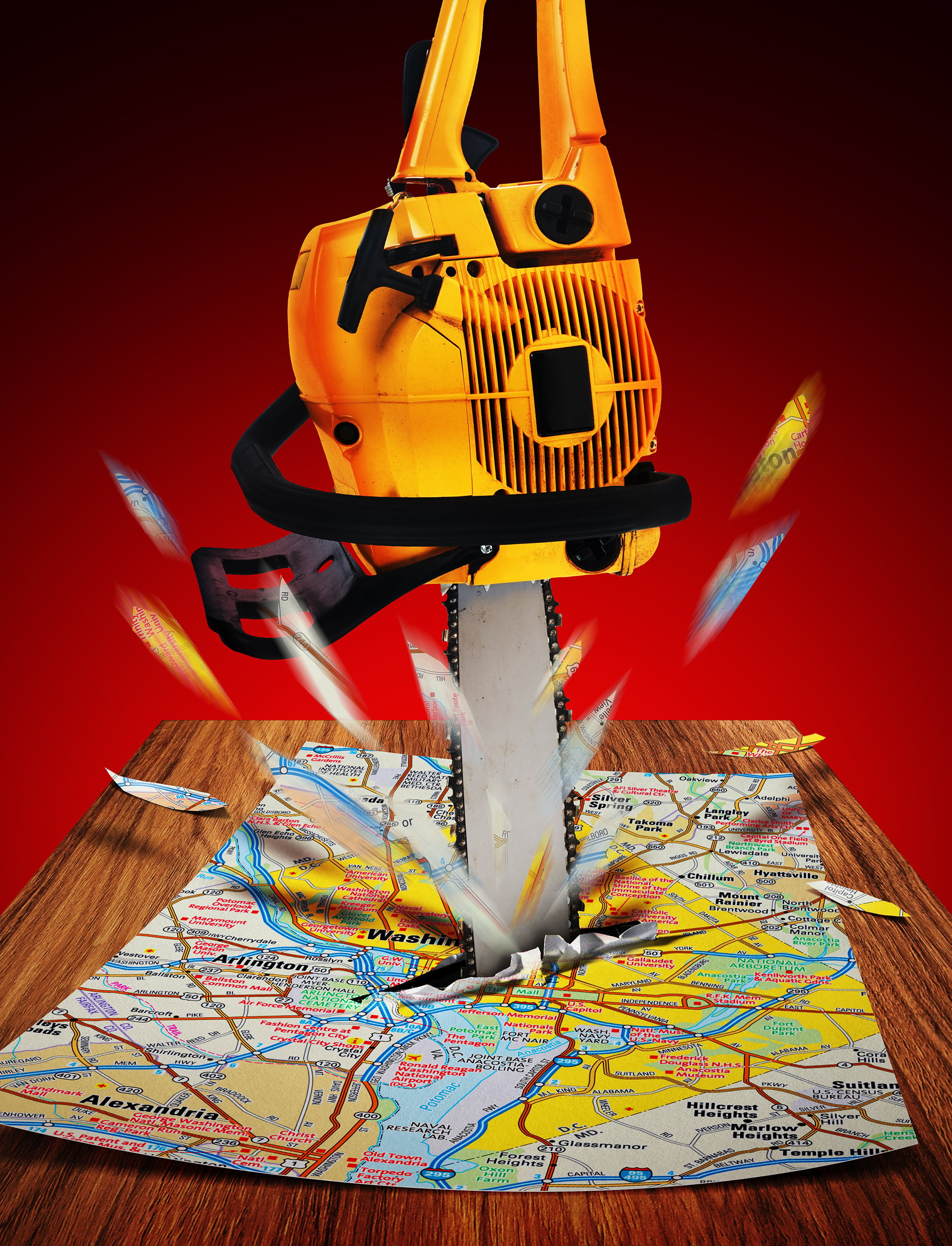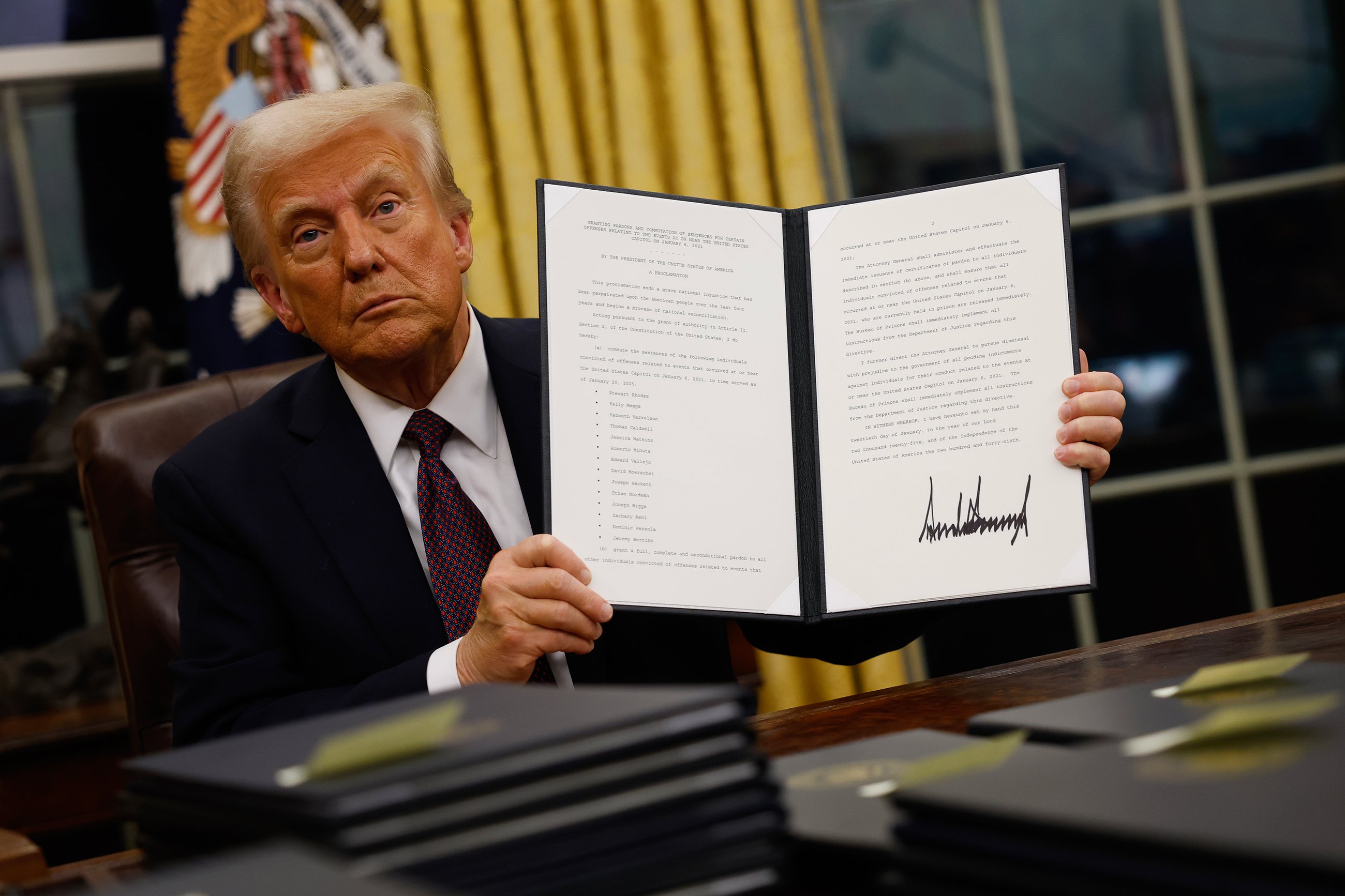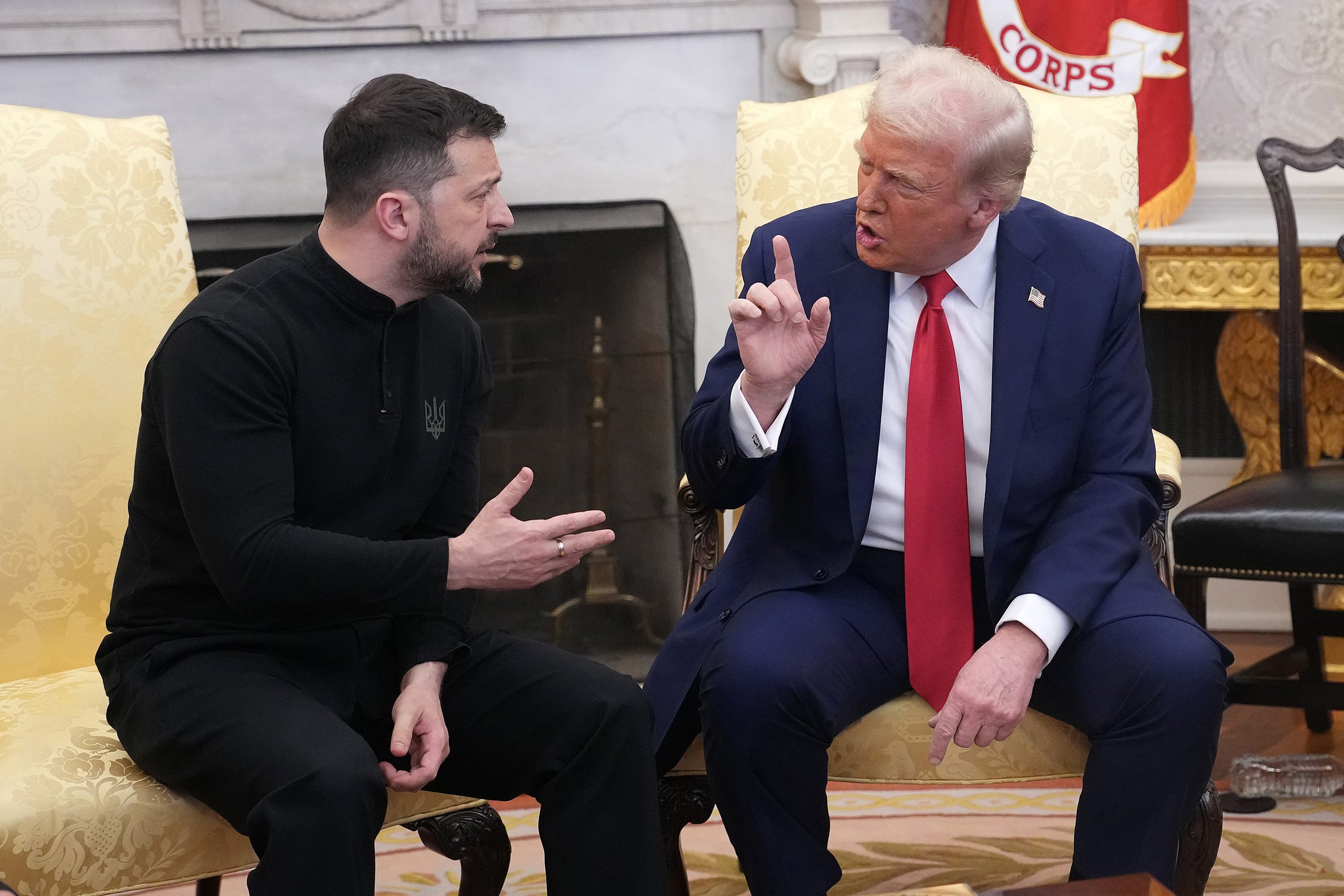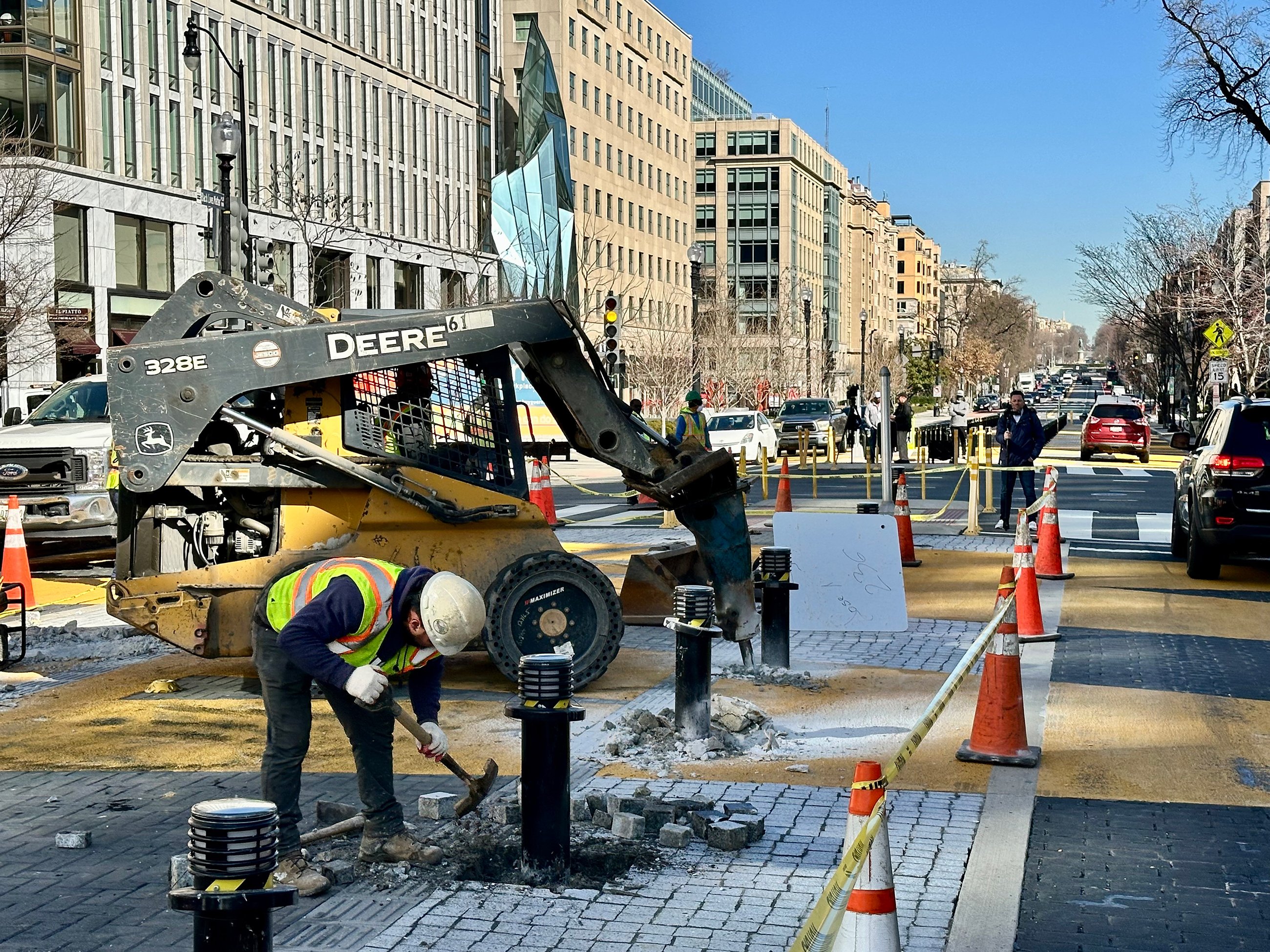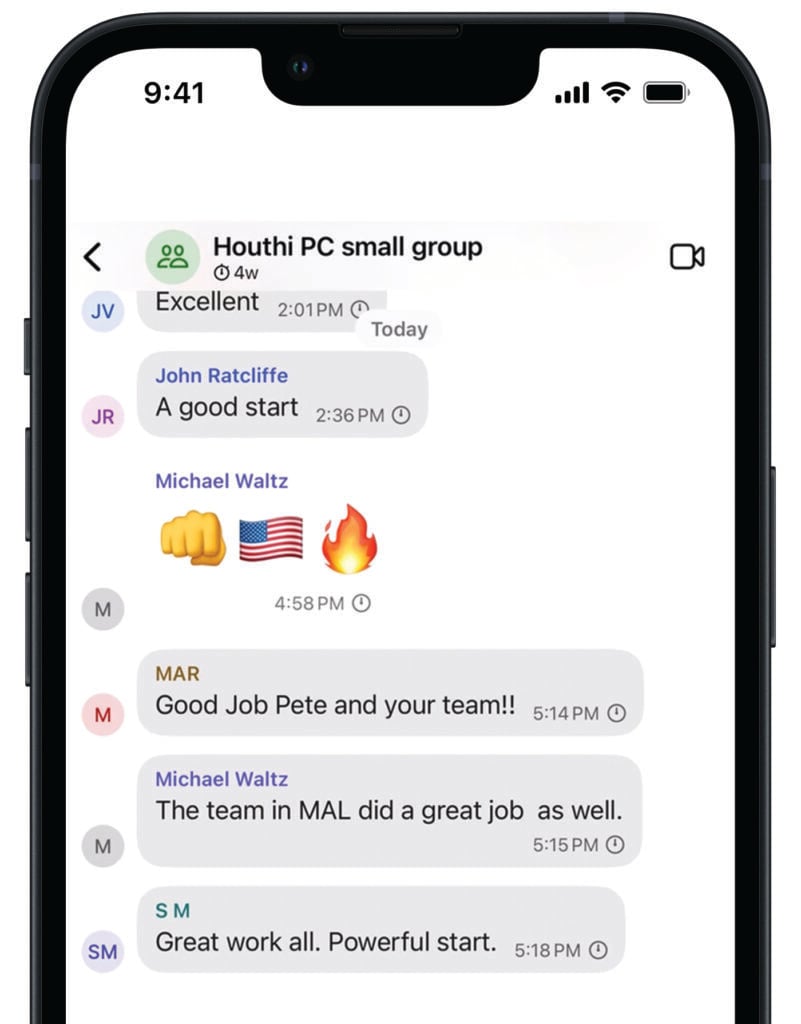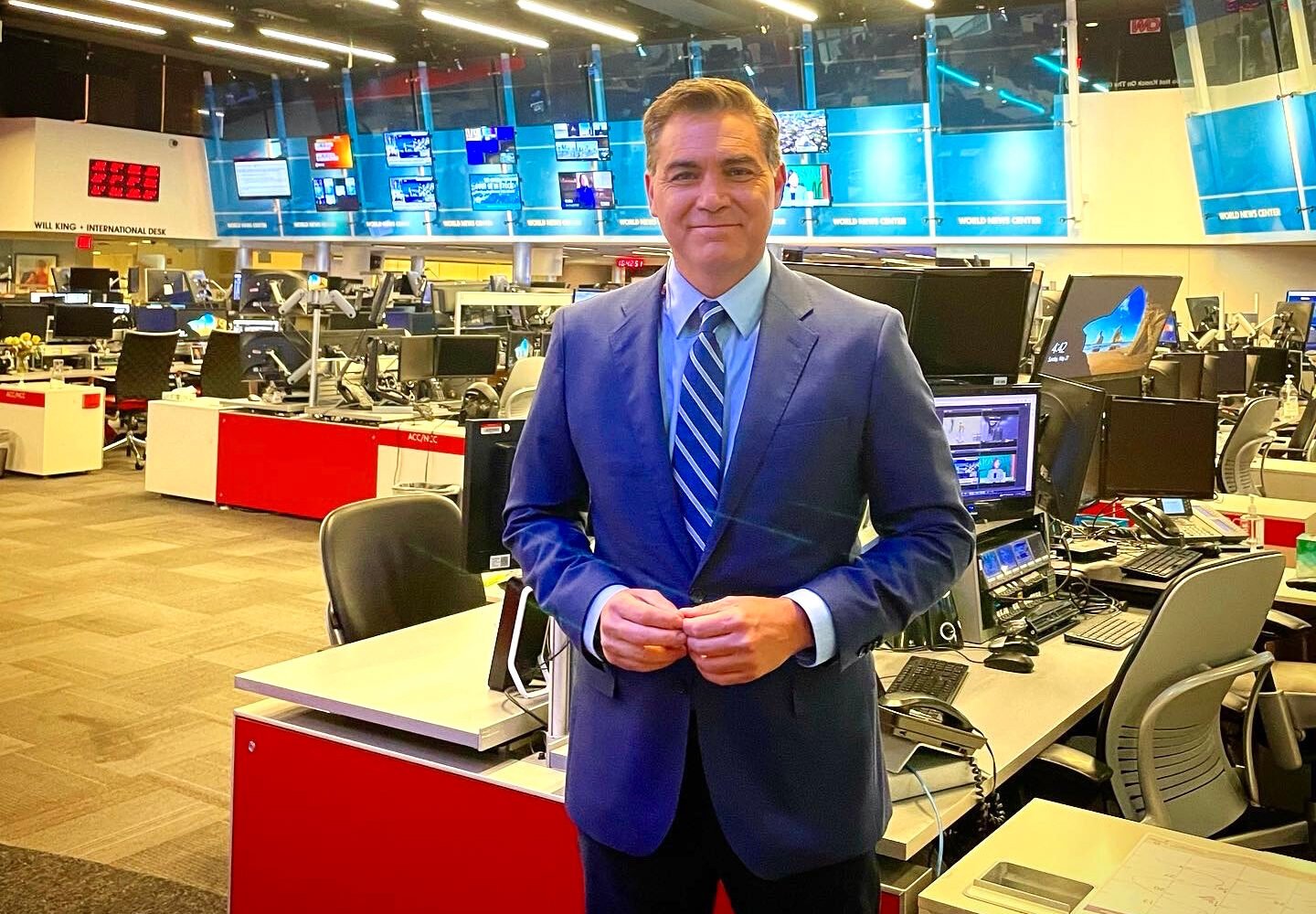Contents
- “I was completely shocked on Inauguration Day when the executive order came out that we were to become DOGE.
- “When the whole ‘fork in the road’ crap was happening, they wouldn’t give us any concrete information.
- “I first moved to DC in the 1990s, so I’ve worked under different administrations in different jobs. You always prepare for the transition. You know things are going to be different. But this has just been the most horrible thing. No one imagined this.
- “Even before Trump made the cuts to Voice of America, a lot of people referred to us as the Titanic.
- “It’s been miserable. There’s no other way to put it.
- “The level of the public engaging with us, I’ve never seen anything like it.
- “We’ve had [medical research] grants pulled because they are related to DEI.
- “By our child’s third birthday, she was very clearly able to articulate to us, ‘I am a girl, I’m not a boy.’
- “I came to this country and overstayed my visa.
- “This is a hot topic among our clients. Since the day after the election, there’s been an overwhelming sense of loss, and a general hopelessness.
- “I see the Trump administration as an existential threat to our community at large.
- “Somebody at some point had to take reducing the size of the government a little more seriously.
- Move Fast, Break Things
ike a blockbuster Hollywood sequel, Donald Trump’s White House return has been bigger and louder, with less restraint and more making stuff go boom. During his first 100 days, we’ve seen global allies alienated and enemies embraced; experts fired and podcasters hired; pardons for J6ers and tariffs for penguins; a disdain for the rule of law and a presidential desire to (maybe!) host the Kennedy Center Honors. Above all, we’ve seen chaos—especially here in Washington, where the administration’s blitz of the federal government, outlined in Project 2025 and spearheaded by Elon Musk and DOGE, has landed with the finesse of an anvil to the head. How are locals doing? We asked, they answered.
Some interviewees spoke anonymously due to concerns about privacy, workplace retaliation, and future employment.
Traumatized at USDS
“I was completely shocked on Inauguration Day when the executive order came out that we were to become DOGE.
Later that night, we were getting messages that we were going to get interviewed the next day by DOGE.
“Those interviews set a really bad tone. They were pretty hostile. If folks tried to make it more conversational, it was like, ‘We’re interviewing you, not the other way around.’ The first question I was asked was ‘What makes you exceptional? What are you the best in the world at?’ Then I got ‘Who are the best, most exceptional people at USDS?’ But other colleagues got ‘Who are some of the worst people?’—as in ‘Who should we fire?’ It felt like they were trying to turn us against each other. The last question was “What do you think of DOGE?,” which I would give a very different answer to if you asked me today.
“My experience was definitely traumatic. I know [Office of Management and Budget director] Russell Vought said he wanted federal employees to be traumatized. Well, good job, Russell Vought. You succeeded.”
–Anonymous No. 1, a former US Digital Service worker
Back to Top
“When the whole ‘fork in the road’ crap was happening, they wouldn’t give us any concrete information.
They wouldn’t answer any of our questions. It was just ‘You should take it. It’s definitely real. We’re definitely going to honor the terms. Definitely, definitely.’
“It was impossible to say whether they were going to actually honor the terms. Nothing like that had ever been done before in government. No one knew what the laws were, what the courts were going to let them get away with, whether Congress was going to let them get away with it. At the same time, you couldn’t evaluate the risk of staying. Am I going to keep my job? What are the odds? They wouldn’t tell us. The only thing I knew for certain is that Elon Musk wanted me to take the deferred-resignation offer. And if Elon wanted it, it was probably a bad thing. So I didn’t take it.
“Forty-four of us were fired on the same day. And they started sending out the notifications at 7 o’clock on a Friday night. That’s the pattern that they use, because they’re jerks.”
–Anonymous No. 2, a former US Digital Service worker
Sacked at USAID
Back to Top“I first moved to DC in the 1990s, so I’ve worked under different administrations in different jobs. You always prepare for the transition. You know things are going to be different. But this has just been the most horrible thing. No one imagined this.
I have worked at USAID in different capacities for a number of years. On a Monday, we were told that the next day was basically our last day. We were not supposed to work—it was administrative leave and that was it. Everyone was scrambling. We had no notice, no ability to plan. A number of people were on maternity leave and weren’t even in the office or aware of what was happening. There were people traveling around the globe. [During later layoffs] management gave everybody, like, 15 minutes to go into their offices and get their stuff—some people had been there for their whole careers. How do you gather all that in 15 minutes?
“It was pretty devastating and hard to come to terms with. Everything I had been doing and thinking was important for the US government and the world is just gone. I liked doing work that benefited others.
“Also, there’s just so much anger. The pointed cruelty of what they did and the lack of care about the impact of what they were doing, to people in the US and around the world, is very hard to comprehend. The people doing it obviously just don’t care, but it’s hard for me to imagine being that person. How could you not care about the impact of what you’re doing?
“I’ve been so impressed by DC. So many people are speaking out, taking action, and supporting each other. I live in the Capitol Hill neighborhood. The support while walking my daughter to school and seeing people on the streets—everybody’s been very kind and generous and caring. It’s a nice feeling. It’s also sad to think about how that might change if everybody moves away.”
– Megan, a laid-off United States Agency for International Development worker
Silenced at VOA
Back to Top“Even before Trump made the cuts to Voice of America, a lot of people referred to us as the Titanic.
We felt we were sinking fast. We were prepared for a RIF [reduction in force]. In that process, it goes by longevity—I ran into our CEO on the Metro and he said, ‘You’ll be fine, you’ve been here for years.’
“I wasn’t fine. They took a giant machete and axed us all. I was totally unprepared when I got the email that we’d been placed on administrative leave. I went into a state of shock. I called HR to ask for guidance, and the representative told me she was just as surprised as I was.
“I don’t know if they’re planning to rebuild VOA or if they’re just going to close it down and gut it. We haven’t had a meeting since this happened. I have two questions: How long will I be paid, and how can I get my personal property? My passport is in my office. It’s a total disaster because we were given no warning, no information.
“I’m married for the time being, but I’m moving toward divorce, and my son is autistic and I have to care for him, so I have a lot of planning and thinking to do about my future. It used to be that years of service had meaning and that a popular radio program meant something. I was going to retire next year. I never expected my career to end like this.”
– Anonymous, a former Voice of America worker
Besieged at the EPA
We were all pretty optimistic after the inauguration, because we felt fortunate to have Lee Zeldin as our administrator. We were looking around and seeing some of the people being nominated to run these other departments, and Zeldin seemed like a moderate. He’d served on these bipartisan climate committees in Congress. He was on the record saying he believed climate change was a problem. And he struck everyone as a reasonable, traditional Republican.
“Within a month or so, it seemed like Zeldin was on this crusade—he just started cutting off funding for programs. There was a day when he put out, like, 31 press releases announcing every single regulation he was going to roll back. Even under the first Trump administration, we hadn’t seen that level of rollback. He said the new mission of the agency was advancing AI and making cars more affordable and making it less expensive to run a business. It was no longer protecting public health and the environment.
“It was heartbreaking. The things we feel like we’re fighting for, we’re so passionate about them. It’s to the core of our beings. These are things folks have been working on their entire careers, and it’s all just going away. There’s a fear that this is really going to be horribly damaging to the environment, to human health, to our planet, to future generations.
“During a cabinet meeting, Trump said Zeldin told him he was going to cut the EPA by 65 percent. The way Trump said it, he’s going to cut the staff, then later someone clarified that he meant the budget, so who knows. It feels like the sword of Damocles hanging over us. What little work we still have, it’s very hard to motivate, because we don’t know if we’re going to be around in two weeks. It’s like the walking dead.”
– Anonymous, an Environmental Protection Agency worker
Demoralized at DHS
Back to Top“It’s been miserable. There’s no other way to put it.
We’ve been working from home for five years, and now we’re back in the office. We actually had a meeting about office etiquette because people are just not getting along, they’re getting in little tiffs.
“I was not paying for childcare. I was home with my child, who’s three now, while I was still getting work done, never missing a call, never missing an instant message. Now he’s in daycare full-time, and we’re paying for it because I have to be in the office 100 percent of the time.
“I hope people who are anti-fed understand it shouldn’t be ‘I suffered, so you need to suffer, too.’ If someone can work from home, they should be able to. I try to be positive, but when you’re sitting in the office doing a job you know you can do from home, it’s like, ‘Why am I here?’ It’s such a waste of my life commuting. And this isn’t just me. Everyone’s spending two hours a day in traffic.
“One of my coworkers who voted for Trump now regrets her vote because of this. She’s very upset. Unfortunately, we kind of knew this was going to happen—maybe she didn’t.”
– Caitlin Sheehan, a Department of Homeland Security worker
Pitied at NPS
Back to Top“The level of the public engaging with us, I’ve never seen anything like it.
You have visitors coming up on a daily basis, while you’re on duty, saying, ‘Hey, hang in there, we love the parks. I’m so sorry for what you’re going through.’ We can’t be political, so we have to just nod, or say, ‘Hey, I’m on the job, I don’t really have an opinion here,’ or ‘I appreciate your kind words.’
“Most of us are practiced at putting on our best face for the public. Behind the scenes, when we’re with coworkers or after hours, you see people lower their guards. They’ll say, ‘Wow, I didn’t expect this,’ ‘I don’t know how I’m going to get through the next few years.’
“We get employees from across the nation. We have different political perspectives. But a lot of people, regardless of how they voted in 2024, are shocked by the scope of what is going on and how many people have been affected by [Elon] Musk and DOGE.”
– Anonymous, a National Park Service worker

Incredulous at NIH
Back to Top“We’ve had [medical research] grants pulled because they are related to DEI.
Pulled if your research even mentions the word ‘diversity.’ That’s insane. Anybody that studies different organisms, different strains—if you remember from the pandemic, we talked about the different Covid variants—researchers often refer to this as ‘diversity’ and talk about diversity of organisms. And if that word is in their proposal, the grant is flagged and they yank the money. Or the word ‘inclusion’—anyone who’s doing clinical trials, we have what we refer to as inclusion and exclusion criteria for participating. If I’m testing a drug that could damage the kidneys, then I may have inclusion criteria that show normal renal function. This is to protect people who participate.
“We are trying to push back [internally]. We’re trying to stand up for our researchers. We recognize that if we go too far, we could get flagged. We can lose our jobs. You can push back some, but we don’t want to lose our jobs. We like what we do! Maybe to these idiots in the administration, that’s a foreign concept, but some people are actually passionate about their work.
“We’re going down a pathway to destruction. These assaults on biomedical research and science are going to knock [the United States] off being at the top. We are the number-one country for biomedical research in the world, and we are not going to hold onto that supremacy with these folks [in charge].”
– Anonymous, a National Institutes of Health worker
Unsafe and Leaving
Back to Top“By our child’s third birthday, she was very clearly able to articulate to us, ‘I am a girl, I’m not a boy.’
We made the decision to support her in being her authentic self. We were living in New Orleans when legislation began moving in Louisiana targeting the rights of transgender people, and specifically transgender children in schools. I was concerned—both as a parent of a transgender kid and a school leader.
“We decided to leave the state and go somewhere that we felt would be as safe and inclusive as possible. Through our research, we narrowed it down to Montgomery County. We made the move here in 2023 and have been really thankful for the community we’ve built and how safe we feel.
“When Trump was elected, we [felt initially] like, ‘Hell, no, we’re not moving. We’re gonna stay and we’re gonna fight.’ Then January rolled around and the barrage of executive orders in those first couple weeks caused a lot of fear—and honestly, terror. I started having anxiety attacks in the middle of the night.
“We and others in the community banded together and said, ‘Okay, let’s get in touch with the [state] attorney general, the senators, any congresspeople, anyone willing to listen, but also reassure us that they were going to try to protect the rights of transgender people. It became very apparent that it was not going to be a priority. In the end, it confirmed our thoughts that the best and safest option for us was to move out of the country.
“My husband wasn’t born in the US. I’m first-generation. There’s other places in the world that we feel will provide opportunities for us and our family that were not necessarily delivered on through the American dream. I started a job search at different international schools. We narrowed it down to Spain. I feel a sense of guilt about leaving, certainly, and then also I feel a sense of relief. I feel at peace.”
– Anonymous, principal at a local school
Undocumented and Afraid
Back to Top“I came to this country and overstayed my visa.
I was an illegal immigrant for many, many years. I was still paying taxes, and I was still contributing. I just didn’t have the ability to travel or the ability to get health insurance. I worked under a different name. I worked years and nobody knew. I was never in photos. You’re hiding all the time—that’s kind of how you live. You experience very scary situations to just find an apartment. You put yourself in dangerous places to try to find some stability, and then little by little you make your life. We’re not criminals. We can’t afford to be committing crimes, you know? We can only afford to work, and work hard.
“Right now, people feel afraid to go to work. But it’s also something that people don’t say, because that will lead you to know that they’re here illegally. But you can see it in people’s eyes, the fear, and that’s the sad part.”
– Anonymous, a DC chef who is now a US citizen
A Therapist’s View
Back to Top“This is a hot topic among our clients. Since the day after the election, there’s been an overwhelming sense of loss, and a general hopelessness.
What we’re seeing—especially with people that work in politics and government or who are adjacent to it—is a real question of identity and their values. A lot are choosing to leave politics or pursue different careers. There’s a lot of questions about ‘Is it safe to live here, physically and emotionally?’ Is this a place where they can continue to thrive and be happy?
“Checking social media, having the news on in the background, or just talking with different colleagues or friends or family [can be] a huge strain on your mental and physical health and ability to function. What are ways that you can give your nervous system a break? Deep breathing, mindfulness, going for a walk, putting your feet in the grass.
“There is such an overload that it becomes even more important to identify when we’re overstimulated. It’s going to be a long four years. It’s a marathon, not a sprint.”
– Lindsay Goldfarb, a DC therapist
Defiant in Congress
Back to Top“I see the Trump administration as an existential threat to our community at large.
They are attacking a big part of our local workforce, actively vilifying them. All these changes and firings are crippling our economy here and hurting people all across the country.
“I don’t feel like this is a time to be afraid. Speak up. Don’t back down. Come to me if you don’t want to be out in the public, and I’ll be your voice. When we do fight, the administration tends to back down or become more hesitant. If we fight, we will eventually win.”
– Suhas Subramanyam, Democratic representative for Virginia’s 10th Congressional district
Pleased and Optimistic
Back to Top“Somebody at some point had to take reducing the size of the government a little more seriously.
Republicans have been talking about this for decades. We’re $36 trillion in debt. The spending is really unsustainable. The time was right, and frankly, President Trump is the first President to really take the issue seriously.
“Some will have disagreements as to the way in which he’s doing it. Because his time is limited, he has to act rather quickly. He only has one four-year term. The stopwatch is noon on January 20, 2029. I don’t know that he could go about it any other way.
“Living in DC, you do hear from people who have concerns, which is certainly understandable. I think this is a process that has to work itself out. Time will tell. During Covid, a lot of people picked up side gigs, other activities they worked on. I don’t know what the [layoff] numbers are really, but I think most of these people will land on their feet.
“And I’ll just say it: I love the idea of [acquiring] Greenland.”
– Patrick Mara, chair of the DC Republican Party
Back to Top
Move Fast, Break Things
Memorable moments from the first 100 days of President Trump’s second term
-
-
January 20
For His Friends

On his first day back in office, Trump pardons, commutes the prison sentences of, or vows to dismiss the cases of the 1,500-plus people charged with crimes in the January 6 attack on the Capitol—ending what he calls “a grave national injustice.” -
January 28
Forked Up
Via a “fork in the road” email, the Trump administration offers almost all federal employees a choice between resigning with temporary pay and benefits or staying on and possibly being laid off. Mass confusion and legal challenges ensue.
-
January 30
Comforter in Chief

The morning after a passenger flight collides with an Army helicopter over the Potomac, killing 67 people, Trump blames diversity hiring. Asked about visiting the crash site, he replies, “I have a plan to visit, not the site, because you tell me, what’s the site? The water? Want me to go swimming?” -
February 9
Manifest Destiny: The Sequel
Referring to the Gulf of Mexico that he ordered renamed, Trump declares “the first-ever Gulf of America Day.” In an interview aired during the Super Bowl pregame show, he reaffirms his desire to make Canada the 51st state.
-
February 10
What Could Go Wrong?
Edward Coristine—a 19-year-old DOGE member who briefly worked for one of Elon Musk’s companies, was fired from a cybersecurity firm for leaking company secrets, and is known online as “Big Balls”—reportedly takes on roles as senior adviser at the departments of State and Homeland Security.
-
February 11
Concerning
Speaking from the Oval Office, DOGE czar Musk, who has not been elected to public office, says the federal bureaucracy is an “unelected, fourth, unconstitutional branch of government.”
-
February 11
Subtle!
Proclaiming that “America is back and will soon be bigger than ever,” Georgia Republican representative Buddy Carter introduces a bill authorizing Trump to acquire Greenland and rename it “Red, White, and Blueland.”
-
February 20
Go to Mars—Please

Wearing a gold chain, a black MAGA hat, and sunglasses, Musk earns a standing ovation at the Conservative Political Action Conference after waving a gilded chainsaw onstage and telling the crowd, “I am become meme.” -
February 22
You’ve Got Spam
Federal employees receive a weekend email from the Office of Personnel Management asking them to send five bullet points of what they “accomplished last week.” While Musk claims that not replying will mean termination, the administration says feds can ignore the message.
-
February 28
Tremendous Content

Near the end of a heated Oval Office meeting in which Trump and Vice President JD Vance berate Ukrainian president Volodymyr Zelenskyy for being “disrespectful” to the US and insufficiently thankful for assistance against Russia, Trump says, “This is going to be great television.”
-
March 1
Is That a Lot?
According to the New York Times, the number of active lawsuits in federal courts challenging Trump-administration actions reaches 100.
-
March 10
Revisionist History

Facing congressional GOP threats to withhold federal funding, DC begins tearing up Black Lives Matter Plaza’s yellow-lettered street mural. “Our focus is on making sure our residents and our economy survive,” says Mayor Muriel Bowser. -
March 11
For Sale
With Musk’s car company, Tesla, drawing protests for his role in the administration, Trump and Musk hawk Teslas from the South Lawn of the White House. Trump also promises to label violence against Tesla dealerships as domestic terrorism.
-
March 17
He Might Have a Point!
During a Kennedy Center visit, Trump suggests giving Kennedy Center Honors to Babe Ruth and Elvis Presley, even though the recognition is not awarded posthumously. “Elvis sells better as a dead man,” Trump says.
-
March 24
👀

Atlantic editor Jeffrey Goldberg reports that he was accidentally added to a Signal group chat of high-ranking administration officials—including JD Vance, Defense Secretary Pete Hegseth, and national-security adviser Mike Waltz—discussing an in-progress operation to bomb Yemen. -
March 27
Are Pandas Woke?
In an executive order “restoring truth and sanity to American history,” Trump puts Vice President Vance in charge of eliminating “improper, divisive, or anti-American ideology from the Smithsonian and its museums,” including the National Zoo.
-
April 2
Penguin Payback
Trump announces a flurry of import taxes, including a 10 percent tariff on the Heard and McDonald Islands, an uninhabited sub-Antarctic island group home to penguins and seals.
-
Photograph of Trump with signed pardons by Anna Moneymaker/Getty Images.
Photograph of ships as site of helicopter crash over the Potomac by Kayla Bartkowski/Getty Images.
Photograph of Musk by Andrew Harnik/Getty Images.
Photograph of Zelensky and Trump by Andrew Harnik/Getty Images.
Photograph of Black Lives Matter Plaza by Evy Mages.
Screenshot of Signal Chat courtesy of The Atlantic.
This article appears in the May 2025 issue of Washingtonian.
